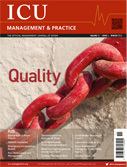Volume 16 - Issue 4, 2016
- ICU
- 30/11/2016
Change content default value
READ MORE
To initiate, maintain and advance a quality improvement programme in your intensive care unit consumes large amounts of time and energy. There are many advantages for quality management in joining an intensive care registry; the most important is access to precisely defined data for comparative audit. Intensive Care Registries Joint...
READ MORECardiac biomarkers, including natriuretic peptides and troponins, have become widely used in the treatment of heart failure and acute coronary syndrome. As we learn more about the function of these markers, their use has begun to expand. We can now track and utilise natriuretic peptides throughout hospital admission to monitor progress of heart failure...
READ MORESevere hypoxaemia and cardiovascular collapse, leading to cardiac arrest, cerebral anoxia and death, are the most frequent complications related to intubation in intensive care units (ICU), associated with difficulty of intubation. To prevent and limit the incidence of difficult intubation, specific risk factors for difficult intubation in the ICU...
READ MORESocial Media in the “Real” World Social media is all around us, and enables real-time communication with patients, families and with colleagues. There are general social networks (Facebook), professional networks (LinkedIn), blogs (WordPress), microblogs (Tumblr) and media sharing sites for photos, videos and podcasts. The Wall Street fortunes of these...
READ MOREA course for aspiring and practising intensive care unit (ICU) leaders will take place in Brussels in January 2017. ICU Management & Practice spoke to some of the faculty, which includes Editor-in-Chief, Prof. Jean-Louis Vincent, to find out more. Who is the course for? This course will attract participants...
READ MOREEric Hoste is Professor in Medicine and Head of Clinic at Ghent University Hospital, Belgium. Prof. Hoste’s primary clinical area of interest is clinical critical care nephrology, and he has published more than 190 original papers, review articles and book chapters primarily within this field. He is a Senior Clinical Investigator, Research Foundation-Flanders...
READ MOREThe intensive care unit (ICU) is a complex environment, due to the surroundings, the heterogeneity of patients, caregiver turnover and the at times lengthy patient stays, which lead to increased complexity. The multiple technologies available add another layer of intricacy. However, with the modern tools available to the intensivist, it is now possible...
READ MOREDelirium is a common complication in intensive care unit (ICU) patients and its occurrence is associated with worse outcome (Inouye et al. 2014; Abelha et al. 2013). Sleep disturbances are considered one of the important risk factors of delirium development (Flink et al. 2012). Recent evidence shows that dexmedetomidine, either at sedative or non-sedative...
READ MOREFor years, 28-day survival was the holy grail of ICU physicians. As ICU survival continues to improve, a high proportion of these ICU survivors experience significant cognitive, psychological, and physically disabling side effects of their ICU stay. These consequences of critical illness, regardless of their admitting diagnosis, have a dramatic impact...
READ MORE